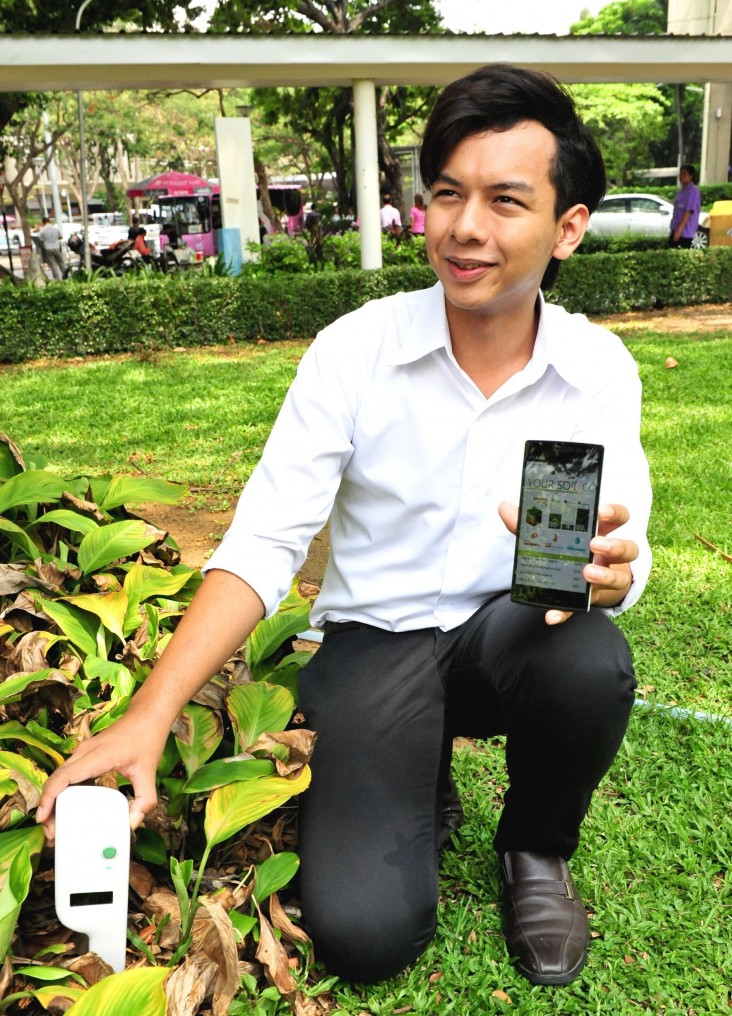
October 2015—Young innovators in Asia are working to address major development challenges through the use of technology, and competitions are bringing their work to life.
Arnon Boonyapravase fends off jokes from friends who wonder what on earth he printed out on his 3D printer. “Some say it is a pregnancy test. Others say it is a breathalyzer,” he said.
But this device is very much down to earth; he pushes it into the soil to help farmers know how to get better yields from their crops.
After syncing the device with the Len-Din app on his smartphone, he analyzes the soil for levels of nitrogen, phosphorus, potassium, moisture, temperature and pH. His app also suggests which crops are best suited for the soil sampled and what nutrients can be adjusted through fertilizer.
A computer science graduate from Bangkok's Sripatum University, Boonyapravase’s success stems from a partnership between Microsoft’s worldwide Imagine Cup competition and USAID’s Regional Development Mission for Asia to engage youth in applying technology to solve development challenges. USAID defines country-specific challenge areas and then, together with implementing partners, mentors young competitors like Boonyapravase and his student team.
After earning second runner-up honors at the Imagine Cup 2014, Boonyapravase’s team submitted a smaller kit in the Samart Innovation Award 2014. They took first prize, a cash award, business start-up funds and a trip to Korea to join an innovation fair. The team has since started a company, Tech Farm, where they are working on solutions to improve Thai farming practices.
In the 2015 Imagine Cup, the team earned second place with a water testing kit called Len-Nam. They plan to market the soil and water testing kits domestically over the next two years, and then go regional.
USAID’s partnership on the Imagine Cup followed a mobile app contest in 2012 driven solely by USAID called Students with Solutions.
“We wanted to do something that would enable more sustained engagement with the students over a longer period of time to really build stronger connections between USAID, our implementing partners and the teams,” said Teresa Leonardo, USAID senior regional science and technology adviser.
Microsoft Thailand sees real benefit in working with USAID. “Imagine Cup focuses on creating the opportunities and the stage for youth to take their talents and innovation to the next level,” said Siriporn Pajharawat, Microsoft Thailand developer and platform strategy director. “The inclusion of themes from USAID helped increase the scale and reach of the competition. It has direct impact on expanding youths’ horizon on issues of social and environmental impacts at a scale beyond their imagination.”
Since 2003, more than 1.6 million students from more than 190 countries have participated in the Imagine Cup. For the 2015 Imagine Cup, USAID engaged bilateral missions in Indonesia and Vietnam to extend this low-cost partnership with Microsoft and students.
“We were born to be remembered,” said Boonyapravase. “This is very much inspired by taking part in the Imagine Cup. Now I have a clearer focus to live a meaningful life and make positive social changes.”
A full-length version of this story originally ran in FrontLines.
LINKS
Follow @USAIDAsia, on Facebook, on Flickr, on YouTube







Comment
Make a general inquiry or suggest an improvement.